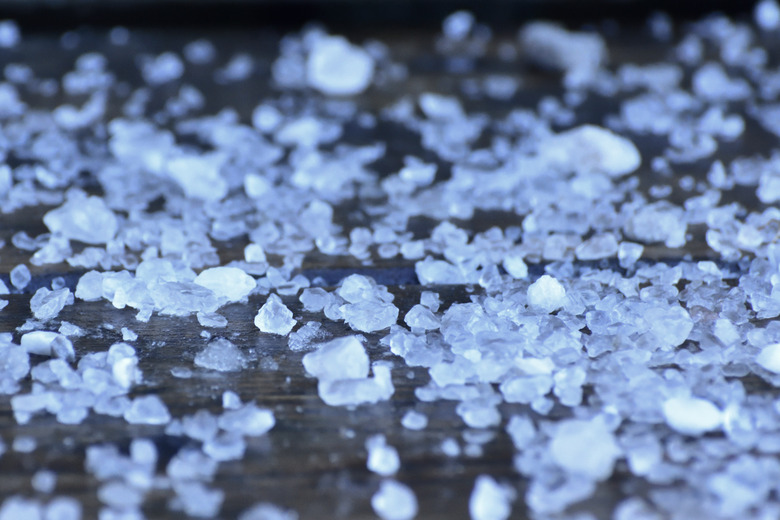How To Dispose Of Rock Salt
We may receive a commission on purchases made from links.
On an icy day, sprinkling rock salt over your front walk may be the difference between getting safely to your car or ending up in the ER after a nasty slip and fall. Rock salt is another name for the mineral halite, also known as sodium chloride, or NaCl. It's commonly used by both municipalities and individuals to minimize iciness on roads and walkways.
Rock salt is essentially the same thing as table salt, though it's not purified like food-grade salt. Like table salt, rock salt is safe to handle and easy to throw away.
How Rock Salt Works
How Rock Salt Works
When you scatter rock salt over a slippery sidewalk, chemistry is responsible for what happens next. The freezing point of pure water is 32 degrees Fahrenheit, but the freezing point of a salt and water solution is lower. (Exactly how much lower depends on how much salt is used.) So, if the ground temperature is lower than 32 degrees, water will freeze on contact and create ice.
When rock salt is scattered over the ice, the sun's heat or friction from people's feet or car tires melts the ice enough for it to mix with the salt and create slush. The slush has a lower freezing point than pure water and won't turn back into ice unless the temperature drops more.
Rock salt is just one product that municipalities and individuals may use to treat icy roads and walkways in winter. There are a variety of salts that melt ice and snow and are safe for home use. Some people even use their own homemade ice melt to tackle slippery surfaces if they don't have rock salt on hand. While rock salt is generally very effective, other kinds of salt may make ice melt more quickly, so compare all your options before choosing one.
Disposing of Rock Salt
Disposing of Rock Salt
Your table salt doesn't expire or go bad. Neither does rock salt, so it's not necessary to dispose of rock salt just because it's old. You can save a sealed container of rock salt for many years, and it will be just as effective when you reopen it as it was when you closed it.
However, if you do want to dispose of leftover rock salt, you can treat it as standard trash. Definitely don't dispose of rock salt by dumping it into your bushes or other vegetation. Salt is devastating to plant life, and pouring salt over an area of land will kill everything that's growing there and make it unlikely that anything will grow there again. Unless your municipality says otherwise, your best bet is to shovel leftover rock salt into a trash bag and put it in your trash cans.
Wear safety gloves and protective eyewear before handling rock salt. It may irritate bare skin, and small pieces may fly into your face as you're moving it from one container to another.
More Uses for Rock Salt
More Uses for Rock Salt
Because rock salt is safe and doesn't expire, you may find another person or organization that wants to take leftover salt off your hands. Look for nonprofits and other cash-strapped organizations that might appreciate free rock salt. Groups that donate household items to low-income families might also be happy to pass along rock salt.
Sometimes, people use rock salt to intentionally kill weeds or other plants they want to destroy, but this isn't advisable. Introducing salt into the soil may damage plants in the surrounding area, and when it rains, the salt in your soil may spread via groundwater and cause damage in neighboring yards. Stick to traditional weed killers that target just the plants you really want to kill.
